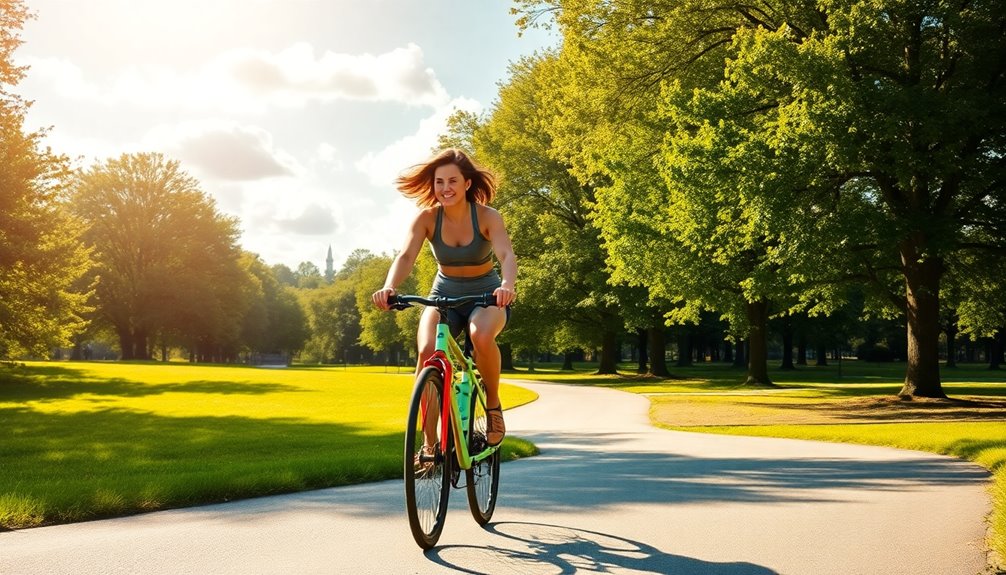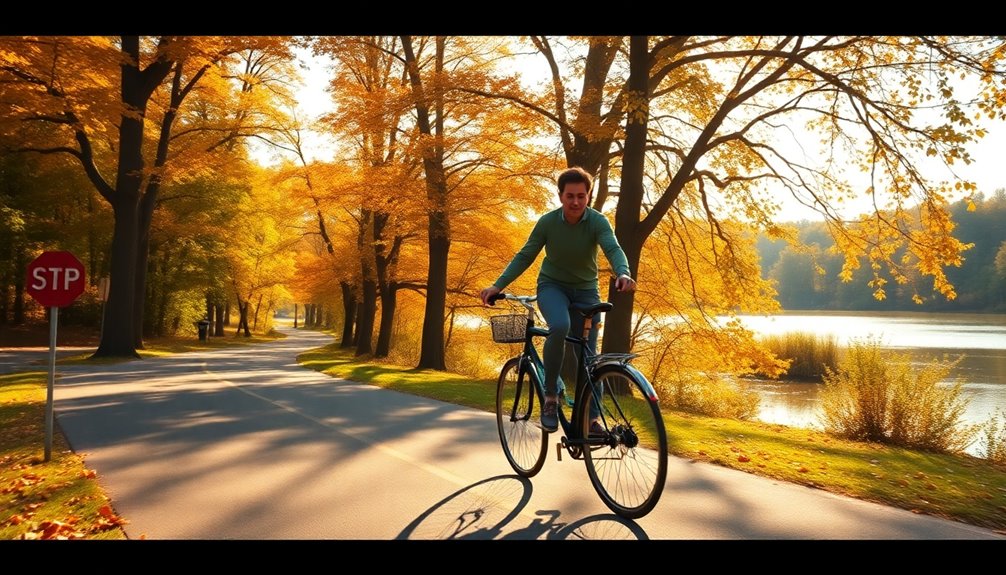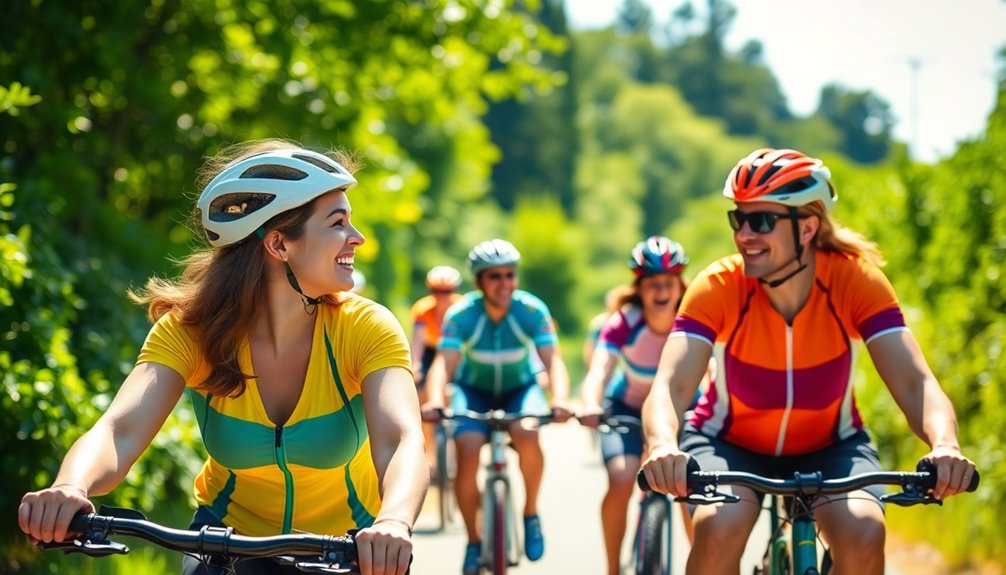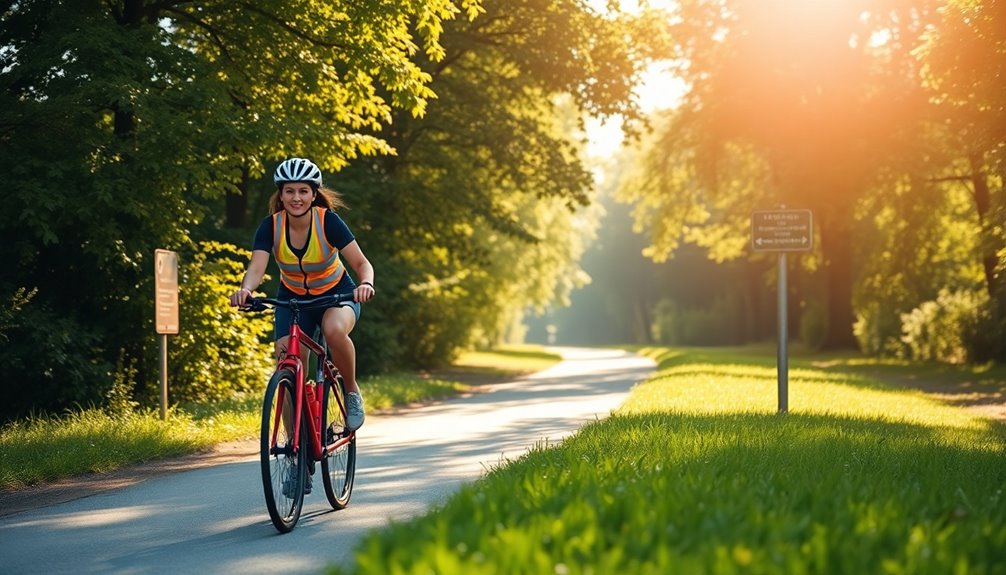Cycling is an effective way to practice self-care by boosting your mental health and emotional well-being. It reduces anxiety and depression symptoms while releasing endorphins that enhance your mood. You can deepen your cycling experience with mindfulness techniques, like focusing on your breath and the scenery around you. Setting achievable goals and celebrating milestones can further enrich your journey. Plus, joining a cycling community fosters social connections that help you thrive. There's so much more to explore!
Key Takeaways
- Cycling serves as a form of self-care by reducing anxiety and depression through physical activity and endorphin release.
- Practicing mindfulness while cycling enhances present-moment awareness, promoting mental clarity and reducing stress.
- Setting achievable cycling goals fosters a sense of accomplishment, boosting self-esteem and motivation.
- Building social connections through group rides provides emotional support and combats feelings of isolation.
- Prioritizing safety with proper gear and maintenance ensures a worry-free and enjoyable cycling experience.
The Therapeutic Benefits of Cycling for Mental Health

Cycling not only offers physical benefits but also serves as a powerful tool for enhancing mental health. Engaging in cycling can greatly reduce symptoms of anxiety and depression, helping you feel more balanced.
As you pedal, your body releases endorphins, lifting your mood and filling you with the joy of cycling. This rhythmic activity allows you to focus on your breath and surroundings, effectively reducing stress and improving mental clarity.
Plus, cycling outdoors connects you with nature, boosting your overall well-being. Regularly hitting the bike can also enhance your self-esteem, as studies show that cyclists often report higher confidence levels and a more positive self-image.
Mindfulness Techniques to Enhance Your Cycling Experience

How can you transform your cycling routine into a more mindful experience? Start by focusing on your breath; this simple act promotes mindfulness and enhances present-moment awareness, helping you reduce stress.
Engage in body scanning techniques while riding to connect with your physical sensations, fostering a deeper understanding of your body's movements.
Avoid distractions like music or phones, allowing you to immerse yourself in your surroundings, which boosts mental clarity.
Practice visualization techniques to maintain a meditative state, picturing your route and desired outcomes to enhance confidence and performance.
Finally, slow down to appreciate the scenery, enriching your connection to nature and contributing to your overall sense of well-being.
Embrace these techniques for a more fulfilling cycling experience.
Setting Goals and Celebrating Accomplishments on Two Wheels

Embracing mindfulness on your rides not only enhances your connection to the present but also sets the stage for setting meaningful goals.
Start by setting achievable goals, like completing a specific distance or improving your speed. These goals give you direction and purpose, boosting your self-esteem and motivation.
As you reach these targets, don't forget to celebrate milestones, whether it's finishing a challenging ride or hitting a personal best. This reinforces positive experiences and encourages you to keep pushing forward.
Consider incorporating a reward system—treat yourself to new cycling gear or a favorite snack after achieving a goal.
Regularly reflecting on your journey will help maintain a positive mindset and deepen your appreciation for the progress you've made. Additionally, just as diversification strategy enhances portfolio stability, varying your cycling routes can keep your rides fresh and exciting.
Building Community and Social Connections Through Cycling

When you join a cycling club or participate in group rides, you're not just hitting the road; you're also building a community that shares your passion.
Bike riding becomes a powerful tool for fostering connections and enhancing your mental well-being. Here's how it can help you:
Bike riding nurtures connections and boosts mental health, making it a vital part of community building.
- Social Support: Surrounding yourself with like-minded individuals reduces feelings of isolation.
- Accountability: Group rides encourage commitment, helping you maintain a consistent cycling routine.
- Networking: Participating in events expands your social circle and creates lasting friendships.
- Inclusivity: Many clubs welcome diverse backgrounds and skill levels, making cycling accessible for everyone.
- Emotional connections formed through shared experiences and active listening can further strengthen the bonds within your cycling community.
Safety Considerations and Tips for Enjoying Cycling Responsibly

Joining a cycling club or participating in group rides can enhance your experience, but it's vital to prioritize safety while enjoying your time on two wheels.
Always wear a properly fitted helmet to protect against head injuries; accidents can happen quickly. Be visible by wearing bright, reflective clothing and using front and rear lights, especially in low-light conditions.
Following traffic laws is essential, as cyclists are considered vehicles on the road, and obeying these rules helps prevent accidents. Regular maintenance checks on your bike, like brake function and tire pressure, guarantee a safe ride.
Finally, use hand signals to communicate your intentions to motorists and other cyclists, reducing the chances of collisions and promoting safer road experiences. Additionally, practicing regular maintenance checks can significantly enhance your safety and bike performance.
Frequently Asked Questions
How to Find Your Balance on a Bike?
To find your balance on a bike, start by ensuring your bike fits you properly; adjust the seat and handlebars for comfort.
Practice positioning one foot on the ground while pushing off with the other to launch smoothly.
As you ride, focus on steering gently and using countersteering techniques to maintain stability.
Regularly practice in open spaces to build confidence and enhance your balance skills, making each ride more enjoyable and secure.
What Is the 75 Rule in Cycling?
The 75 Rule in cycling suggests you should train at about 75% of your maximum heart rate. This approach helps you optimize endurance and performance while preventing burnout.
To find your maximum heart rate, subtract your age from 220. By sticking to this rule, you enhance fat metabolism, improve aerobic capacity, and reduce the risk of injuries.
It's a great way to maintain intensity while ensuring adequate recovery during your training sessions.
How Do I Stop Being Wobbly on My Bike?
To stop being wobbly on your bike, focus on your body position and keep an upright posture.
Practice starting techniques, placing one foot on the ground while the other is on a raised pedal. Adjust your seat height for ideal power, and work on your steering skills in safe areas.
Use countersteering to maintain stability during turns.
Gradually build your confidence by relaxing and practicing in controlled environments to enhance your balance over time.
Can Cycling Improve Your Balance?
Yes, cycling can greatly improve your balance. As you ride, your core muscles engage, helping you maintain stability.
Steering and maneuvering turns challenge your coordination, enhancing your dynamic balance skills. Regular practice on varied terrains forces you to adapt, boosting your proprioception and overall balance capabilities.
Whether you're young or older, cycling helps counteract age-related decline in balance, making you more confident both on the bike and in everyday activities.
Conclusion
Cycling isn't just about physical fitness; it's a powerful tool for mental well-being. Picture yourself gliding through serene landscapes, feeling the rhythm of your breath and the rush of fresh air. By integrating mindfulness and setting personal goals, you enhance your ride while building connections with fellow cyclists. Remember to prioritize safety, ensuring each journey is enjoyable and fulfilling. Embrace this balance on the bike, and you'll discover a profound sense of self-care and community.








